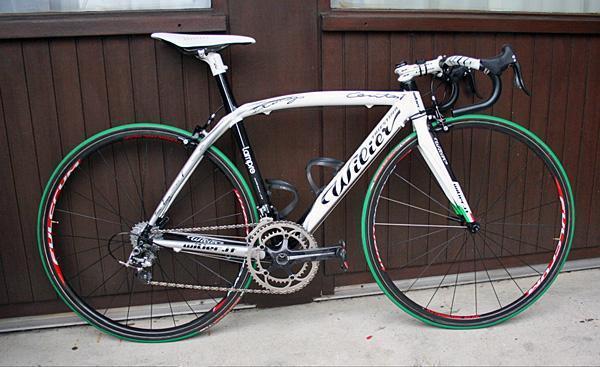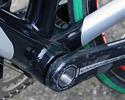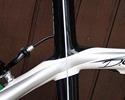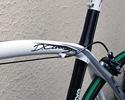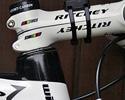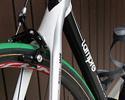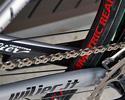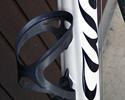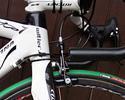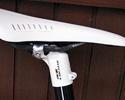
Recently on Cyclingnews.com |
Pro bike, August 7, 2008
Damiano Cunego's Lampre Wilier Triestina Cento Uno
The steed of the Piccolo PrincipeBy Ben Atkins The 2008 Tour de France was not a vintage one for Damiano Cunego. The 2004 Giro d’Italia winner skipped his national tour in favour of an all-out tilt at success in la Grande Boucle, but a combination of poor form and a huge slice of bad luck forced him to abandon the race two days before Paris. That bad luck - in the form of a nasty face-first crash into a concrete barrier and its subsequent injuries - also cost him his lead in the ProTour classification by preventing him from being competitive in the Clásica San Sebastián. As if that weren’t enough, it even prompted him to withdraw from the Italian Olympic team for Beijing. While Cunego himself hasn’t had the best time as of late, as least he has a new bike from team sponsor Wilier Triestina. His new Cento Uno evolves from the existing Cento frame and now includes an integrated seat post, which supposedly saves 120g. Less immediately obvious are crankset bearings which are directly integrated into the oversized bottom bracket shell. Wilier says this system integrates seamlessly with most cranksets - Campagnolo being the natural default - but composite spacers are available for others. Though Cunego’s custom-sized frame bears a number of features of the production Cento Uno, it is clearly not a production machine. For instance, where the stock Cento Uno has pronounced asymmetric chain stays - where the drive side one actually curves downwards - and uniquely ‘suspended’ dropouts, Cunego’s frame has much straighter chain stays and rather conventional-looking two-piece aluminum dropouts. According to Wilier Triestina PR man Mark Deterline, Cunego’s frame is a pre-production creation that marks "the progression from the Le Rois the team uses as their standard models and the Centos Cunego rides, to the Cento Uno production model." This perhaps shouldn’t come as any surprise as it’s the norm for manufacturers to use their sponsored teams and riders for valuable feedback on test mules. "Lampre doesn’t try to hide the bikes at events, or make Cunego change bikes for interviews or public training sessions," Deterline continued. "In fact, [Wilier Triestina is] kind of proud of this way of working, because it leaves them freedom to experiment before committing to final production designs." Of course, the Lampre star also gets a special black, silver and white paintscheme to match the white ProTour jersey that he’d held since finishing fourth in June’s Tour de Suisse. The only colour that appears anywhere on the frame is the Italian tricolore detail on the fork ends. Lampre’s groupsets are supplied by Campagnolo, and Cunego’s bike has an almost complete Record groupset. The exception to the Italian company’s top gruppo is the Chorus front derailleur whose steel cage is more durable than Record’s carbon one, according to the Lampre mechanics. The remainder of the groupset is a fairly conventional affair with a 170mm chainset, fitted with 53 and 39 tooth rings, an 11-25T cassette and the ubiquitous "Red" edition Ergopower levers that have a slightly stiffer action than standard. Campagnolo subsidiary Fulcrum is the Lampre wheel sponsor and Cunego’s bike is fitted with a pair of its feathery Racing Light tubulars. With their carbon rims and oversized aluminium hubs they weigh in at a claimed 1280g a pair and are some of the flightiest hoops in the pro peloton. Pairing these lightweight wheels with Vittoria’s hardy Pavé Evo-CG tubulars might seem a strange choice, but despite their 24mm section they are only a few grams heavier than the more usual Corsa Evo-CX. Moreover, they are slightly more comfortable, provide better grip and wear longer. The bike’s finishing kit is supplied entirely by US company Ritchey. The integrated seatpost is topped by Ritchey’s "stubby" head, which clamps itself to both the top of the carbon tube and the braided carbon rails of the fi’zi:k Arione saddle. Up front, a "wet white" Ritchey WCS 4-Axis stem - which matches the frame nicely - clamps a pair of traditional bend WCS Classic bars. We caught the bike as it was just being built and before the bar tape was fitted, but rest assured it was wrapped in Gist Super Ribbon in time for the first stage start. Now not going to Beijing this month, Cunego will be taking some time out to recover from his Tour de France injuries, so it’s not quite clear when we’ll see him race next. It’s possible that he will look to build his late season form at the Vuelta a Espana as he did last year, and as a shoo-in for his national team he should feature in the Squadra Azzura as they host the World Championships in September. Heal up, Damiano, your bike is waiting for you. PhotographyFor a thumbnail gallery of these images, click here Images by Ben Atkins/Cyclingnews.com
| |||||
Full specificationFrame: Wilier Triestina Cento Uno *** Critical measurements Front brake: Campagnolo Record |
Wheelset: Fulcrum Racing Light Bars: Ritchey WCS Classic Road 40cm Pedals: Time RXS Carbon Total bike weight: 6.96kg (15.34lb) | ||||

